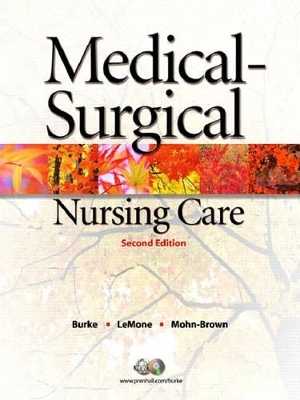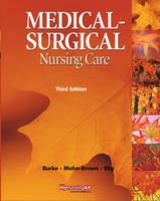
Medical-Surgical Nursing Care
Pearson
978-0-13-171472-4 (ISBN)
- Titel erscheint in neuer Auflage
- Artikel merken
For Medical-Surgical courses in Licensed Practical/Vocational Nursing programs
Answers the question, what do practical vocational nurses need to know and to be able to do in order to deliver safe and effective medical-surgical nursing care? This comprehensive text prepares basic practical/vocational nursing students to care for adult clients with medical or surgical disorders or diseases. With an emphasis on the nursing role, it explains the risk factors, causes, and pathophysiology of common disorders and diseases, and reviews diagnostic tests and medical management of the disorders. A focus on nursing care is presented in a nursing process format–including assessment data to collect, nursing diagnoses with suggested interventions and their rationales, and evaluation data to determine the effectiveness of nursing care.
Karen M. Burke, RN, MS Karen M. Burke is the Education Consultant for the Oregon State Board of Nursing. She obtained her initial nursing education at Emanuel Hospital School of Nursing in Portland, Oregon, later completing baccalaureate studies at Oregon Health & Sciences University, and a master’s degree at University of Portland. Ms. Burke has extensive clinical nursing experience in acute care and community-based settings, as well as more than 20 years of experience as a nurse educator and program administrator. As a nurse educator, Ms. Burke is known as a leader and an innovator. She led the faculty of an associate degree nursing program in developing an online program to deliver nursing education to a distant rural community. Ms. Burke is actively involved in nursing education in Oregon, participating in the development of an educational consortium of a public university and local community colleges to deliver a common baccalaureate degree nursing curriculum around the state. She also is actively involved in the Oregon Nursing Leadership Council Education Committee, helping identify strategies to recruit and retain nursing faculty, develop innovative clinical models, and provide policy guidelines for use by all nursing education programs in the state. In addition, Ms. Burke is working with nursing leaders and educators to identify and develop strategic plans to more effectively educate and use practical nurses (LPNs) in Oregon. As education consultant to the Board, she works directly with new and existing practical and registered nursing programs to promote and maintain current and high-quality nursing education for the citizens of Oregon. Ms. Burke strongly values the nursing profession and believes in the importance of a strong education in the art and science of nursing for all students entering the profession. She believes that her diverse experience as a nursing student, clinical nurse, and nurse educator and administrator has prepared her well to relate to nursing students in diverse educational settings. Ms. Burke and her husband Steve love to garden, travel, and spend time with their extended family. Ms. Burke also enjoys a passion for quilting, accumulating and gradually completing multiple UFOs (unfinished objects). Priscilla LeMone, RN, DSN, FAAN Priscilla LeMone has spent most of her career as a nurse educator, teaching medical-surgical nursing and pathophysiology at all levels from diploma to doctoral students. She has a diploma in nursing from Deaconess College of Nursing (St. Louis, Missouri), baccalaureate and master’s degrees from Southeast Missouri State University, and a doctorate in nursing from the University of Alabama-Birmingham. Dr. LeMone has retired from the Sinclair School of Nursing, University of Missouri-Columbia as Associate Professor Emeritus. Dr. LeMone has received numerous awards for scholarship and teaching during her over 30 years as a nurse educator. She is most honored for receiving the Kemper Fellowship for Teaching Excellence from the University of Missouri-Columbia and the Unique Contribution Award from the North American Nursing Diagnosis Association, and for being selected as a Fellow in the American Academy of Nursing. She believes that her education gave her solid and everlasting roots in nursing. Her work with students has given her the wings that allow her love of nursing and teaching to continue through the years. Elaine L. Mohn-Brown, RN, EdD Elaine L. Mohn-Brown received her Diploma in Nursing from Akron General Medical Center School of Nursing in Akron, Ohio. She has baccalaureate and master’s degrees in nursing and health education from Metropolitan State College and University of Northern Colorado, and an EdD in higher education administration from Brigham Young University. She has worked in critical care units in Ohio and Colorado. Her first teaching position was as a practical nursing instructor at Larimer County Vocational-Technical Center in Colorado. For the past 26 years, she has been on the faculty of the ADN Program at Chemeketa Community College in Salem, Oregon. Through thought-provoking classroom presentations and hands-on acute care medical-surgical experiences, she has encouraged students to question and understand the rationale for their nursing care. She has implemented an extensive orientation program for novice nursing faculty at Chemeketa Community College and in 2005 developed Clinical Teaching in Oregon, a DVD to educate new clinical nursing faculty. Dr. Mohn-Brown serves as a member of the Editorial Advisory Board for Nurse Educator and is a program evaluator for the Northwest Commission on Colleges and Universities. She has published nationally and conducts workshops at the national level. Her love of nursing and teaching has taken her to numerous international and national conferences. Linda Eby, RN, MN Linda Eby received her baccalaureate and master’s degrees in nursing from Oregon Health and Sciences University. She has 31 years of experience in nursing. Her nursing practice has been in critical care, home health/hospice, and psychiatric mental health nursing. As a Clinical Nurse Specialist in clinical genetics, she coordinated the Prenatal Genetics Clinic at OHSU. She has conducted workshops on teaching diverse students of nursing. As secretary of the American Federation of Teachers-Oregon, she serves as an advocate for the rights of education employees and students. Ms. Eby has been teaching nursing at the community college level for 20 years. Her current teaching areas are nursing fundamentals, diabetes care, transcultural nursing, and psychiatric mental health nursing. She is the coordinator of a Nursing Student Success Program, which serves students who speak English as a non-native language, immigrant students, and other nontraditional students. Ms. Eby loves and respects the profession of nursing even more now than she did 31 years ago. Fortunately, she has two wonderful daughters and two good dogs to provide balance in her life.
Nursing process care plans–Follow discussions of selected major disorders, bringing the disorder and its effects on the client and family to life.
Emphasize the holistic nature of nursing care and allow students to apply what they have learned.
Critical thinking self-checks–Follow each care plan.
Challenge students to expand and refine their critical thinking skills related to assessment and intervention.
Rationale for each nursing intervention.
Promotes students' understanding of the “why” of each action.
Nursing care and procedure checklists.
Summarize specific nursing care activities for particular procedures or surgeries, and review key steps in performing previously learned nursing care procedures.
Multi-system effects diagrams.
Identifies clearly the multi-system effects of complex disorders–such as diabetes mellitus.
Assessmentand Client Teaching boxes throughout.
Enables students to see the type of subjective and objective data to collect during the assessment, and assists them in preparing for and practicing client instruction.
Pharmacology tables.
Highlights the major category of drugs, common examples, purpose, nursing implications, and client teaching.
Critical Thinking care map–Provides a brief case study, assessment data, and a nursing diagnosis for a specific client.
Requires students to sort the data and sample interventions, evaluate the results, chart their findings as they work through the nursing process with a selected client, and prepares them for on-the-job critical thinking.
Clinical alerts
Alerts students to critical information for providing safe and effective nursing care.
Chapter-opening Learning Outcomes
Helps students focus and define their learning as they read and study chapter material.
Chapter-end NCLEX-PN®style review questions and test tips.
Allows students to review chapter material and practice test-taking skills.
Chapter key points and key terms for further study.
Reiterates important information from each chapter and stimulates a review of its content.
Clear, concise writing style.
Provides a straightforward presentation that is at an appropriate level for the basic nursing student.
Four-color art program.
Highlights major boxes and information (for quick retrieval) related to unique characteristics of specific population groups, manifestations and risk factors for disorders, specific tests and procedures, and client teaching.
Focus on Older Adults boxes
Population Focus boxes
Cultural Care Strategies
Complementary Therapies boxes
Nutrition Focus boxes
Unit Wrap-Ups
| Erscheint lt. Verlag | 29.6.2006 |
|---|---|
| Sprache | englisch |
| Maße | 224 x 283 mm |
| Gewicht | 3120 g |
| Themenwelt | Pflege ► Fachpflege ► Chirurgie / OP-Pflege / Orthopädie |
| ISBN-10 | 0-13-171472-4 / 0131714724 |
| ISBN-13 | 978-0-13-171472-4 / 9780131714724 |
| Zustand | Neuware |
| Informationen gemäß Produktsicherheitsverordnung (GPSR) | |
| Haben Sie eine Frage zum Produkt? |
aus dem Bereich



